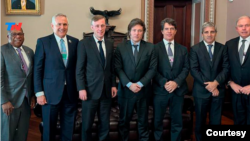Argentine President-elect Javier Milei’s foreign minister-designee has announced that Argentina will not be joining BRICS, an international grouping of countries increasingly seen as being led by Beijing in its bid to challenge initiatives led by Western, democratic nations.
The announcement Thursday by Diana Mondino marks a reversal of a key decision made by the outgoing government that was seen as pulling Buenos Aries ever closer to China’s orbit. It also comes despite a personal letter Chinese communist leader Xi Jinping wrote and had hand-delivered to Milei last week.
The incoming Milei government’s position on BRICS has been closely watched. On the campaign trail, Milei was a harsh critic of China’s political system. By contrast, his opponent, Sergio Massa, a minister in charge of economic affairs in the outgoing government, welcomed China’s increasing footprint in their country with open arms, even joking about a new republic under the name of “Argenchina,” Bloomberg and other media have reported.
BRICS — an acronym for Brazil, Russia, India, China, South Africa — is increasingly seen as a geopolitical group led by Beijing that seeks to expand its influence and reshape the international order.
Last year, Argentina’s ambassador to China disclosed that Xi had personally extended an invitation for Argentina to join the group. The invitation was made official at the most recent BRICS summit, held in August in Johannesburg, South Africa, where it was announced that the memberships of Argentina, along with Iran, Egypt, Ethiopia, Saudi Arabia and the United Arab Emirates, would take effect on January 1, 2024.
Christopher Ecclestone, a London-based strategist and specialist on Argentina, told VOA that from Beijing’s perspective, the invitation to join BRICS amounted to the equivalent of “you’re now one of us.”
A letter hand-delivered
The outgoing Argentine government, led by President Alberto Fernandez, whose term ends in a little over a week, openly embraced the invitation and is seen as publicly pro-Beijing. Milei, who won a landslide victory against the left-leaning Massa, is known to have compared the Chinese regime as “killers” or assassins who go after those who wish to live freely. Milei also repeatedly said his government would distance itself from such regimes.
Last week, though, a message Milei posted on X, formerly known as Twitter, thanking China’s Xi, had some wondering where he stood, now elected, concerning foreign policy toward China.
“I thank President Xi Jinping for the congratulations and good wishes he sent me through his letter. I send you my most sincere wishes for the well-being of the people of China,” Milei wrote on November 22, above a full-page letter translated into Spanish addressed to him from Xi, from Beijing, dated November 21.
Beneath the full-page translation can be seen what presumably was the original letter written in Chinese, with Chinese wording “Chairman Xi Jinping” at the top of the stationery. Xi is only addressed by his communist party title, general secretary, and/or his national title, chairman, inside China.
That same day, Mondino retweeted a photo showing her and China’s top diplomat posted to Buenos Aires, Wang Wei, and another man who might have been a translator. Everyone was shown with broad smiles in that photo. Mondino did not explain what the meeting was about or when it took place.
Argentine media later reported that Wang had met with Mondino on November 21 to hand deliver the letter from Xi, less than 48 hours after Milei had won the election.
Ecclestone was struck by the “pacifist” tone of the letter.
“Interestingly, in the first sentence he uses the polite form of ‘you’ when referring to ‘your election,’” Ecclestone told VOA, while going over the Spanish translation. The overall tone of the letter is “very formal, very welcoming, very nonthreatening,” with a “very capitalist” element thrown in the mix, Ecclestone said.
The phrase “ganancia compartida” appeared twice in the letter, Ecclestone pointed out. “It literally means ‘shared profit,’” and can be read as a not-very-subtle hint at the opportunities presented to Milei if he and Argentina were to be willing to work with China, the analyst said.
“It’s got no threats in it, it’s all love and kisses; it’s China and Argentina in love,” Ecclestone said.
“It’s an olive branch — and it’s an olive branch with flowers,” he said, describing the letter.
The olive branch stands in sharp contrast to the warning Beijing issued against Argentina and its newly elected leaders the same day Xi’s personal letter to Milei was delivered in Buenos Aires.
“It would be a grave mistake if Argentina were to cut off ties with great powers such as China or Brazil. China is Argentina’s important trade partner,” Mao Ning, a Chinese foreign ministry spokesperson, stated at a news briefing held in Beijing on November 21.
Mao acknowledged that Xi had conveyed his congratulations to Milei at the November 23 news briefing but did not say that the message had been hand-delivered by China’s ambassador. The wording in Chinese, zhidian, made it appear as if Xi had telephoned Milei, or sent him a telegram, instead.
Blow to Beijing
Since he was elected, Milei has reiterated his three-pronged thinking on trade and foreign policy in an interview with Argentine media. In it, he called himself first and foremost “an ally of the United States, Israel and the West.” Another pillar of his thinking, he said, is “I will not push or promote relationships with dictatorships, communists, those who have no regard for peace or don’t hold democratic values.”
Thirdly, he said, businesspeople are free to trade with whomever they want.
David Day, who heads the Honolulu-based Global Risk Mitigation Foundation, told VOA that Argentina’s decision is a blow to Beijing.
Among other objectives, Beijing “has been attempting to push the BRICS into an alternative trading bloc with an overt intent to get those countries off of the U.S. dollar,” he said.
In a sign that BRICS is aiming to be much more than a trade and economics-oriented grouping, China organized a BRICS leaders’ online conference on November 21 to “coordinate positions and take actions” regarding the Hamas-Israel conflict, as Xi noted in a keynote speech.
“The potential for Argentina leaving the Chinese tent is very troubling to Beijing geopolitically, as it cuts against the trend of China’s takeover and growing influence in the Americas over the last several years,” Day said.
“Beijing’s worry is that Argentina and Milei could begin a reversal [of those gains],” he continued, “hence we are going to see both ‘hard’ and ‘soft’ approaches coming out of Beijing in an attempt to keep Argentina in line.”
June Teufel Dreyer, a political scientist and China specialist at the University of Miami, told VOA that the path of relations between Buenos Aires and Beijing will become clearer over time.
“Let’s see whether the flower on the olive branch withers or continues to live on,” she said.
Closer ties with Washington
Meanwhile, there are signs that Buenos Aires’ ties with Washington are being strengthened. Earlier this week, Milei embarked on a personal trip to the United States before he is due to take office on December 10.
On Tuesday, Milei and some of his closest advisers met with Jake Sullivan, President Joe Biden’s national security adviser, at the White House. Milei later described the meeting as “extraordinary.” Economic issues and standing up for democracies around the world were among the topics discussed in their meeting, according to a statement released by the White House.
The Associated Press reported that Milei’s office said after the meeting that Sullivan, speaking on behalf of the administration, “conveyed the willingness of the United States to cooperate in the transition of the incoming Argentine government, given the challenging political, economic and social circumstances that the country is facing.”
Milei also discussed with U.S. officials his commitment to values of freedom, his office said.





